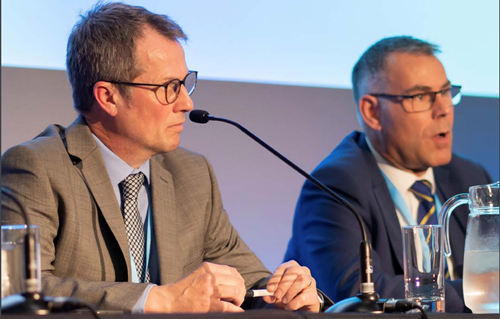Fed secretary calls for fully independent pay mechanism
5 March 2024
The secretary of the West Midlands Police Federation has emphasised the need for a fully independent pay mechanism.
Tim Rogers said the current system has proven to be unfair, unfit, and detrimental to the pay and conditions of Police officers.
He emphasised that the membership ballot, which was voted through in June 2023 asking if the Police Federation of England and Wales (PFEW) should explore industrial rights and a return to collective bargaining and binding arbitration, should take place as soon as possible.
He was commenting after the National Police Chiefs Council (NPCC) submitted its evidence on officer pay to the Police Remuneration Review Body (PRRB).
The NPCC submission ‘calls for a fair pay deal for officers reflecting their unique contribution to society, the limitations on them and the real terms 17% pay cut over the past decade’.
Tim said: “We are grateful to the NPCC for their work and effort in the submission.
“But if you look at years gone by, all the work, evidence and great research that goes into the pay submission is often irrefutable, but then simply ignored by government.

West Midlands Police Federation secretary, Tim Rogers (left).
“This is why we came out of it in the first place, and sadly nothing’s changed since we did.
“The current process is not fair or transparent, it disallows our ability to effectively negotiate on behalf of our members to secure them an appropriate pay deal. We now need to seek other options to have our employers listen, and our submissions properly considered.
“The current administration purports to be the party of law and order yet has allowed police pay to fall significantly below where it ought to be.
“This is why, we have been seeking a return to collective bargaining and binding arbitration, something we had for 80 years previously.
“I’m not saying it was perfect but it gave us the ability to sit down and negotiate with decision makers.”
At its Annual Conference last year, PFEW agreed it would ballot the membership on pursuing industrial rights for them after more than a decade of requesting the Government to address police officers’ poor working terms and conditions.
Tim said PFEW should be balloting members in the run up to this year’s pay review and General Election.
“We know that pay submissions are being put into the Government and the PRRB,” he said.
“The opportunity is there to put pressure on the Government to show how dissatisfied we are with the current pay mechanism.
“That would mean asking the membership do we want to start researching whether we need to legally challenge our ability to go back to binding arbitration and industrial rights?
“We think wholeheartedly we should, and it’s a considered view of the members we hear from on a regular basis.
“The timings would have been far better in the run up to a General Election and we knew the next round of pay negotiations were going to be starting.
“Our actions would no doubt focus the Government’s decision making, and our requests on balance and evidence are reasonable.
“And those are to sit around a negotiating table with the Government on something as important as pay and remuneration for police officers, which makes perfect sense to the sensible.
“The Government has failed to deliver for us on a fair basis for a number of years and, as a result of that, our real-term pay has fallen behind by 17 per cent.”
Tim said moves last year by PFEW to explore seeking industrial rights had a positive effect on the pay settlement.
"Last year, in general terms, we did okay,” he said. “We got 7%, which was 1% more than other public sector workers the Government saying this was in recognition, in part, of our unique status and inability to strike.
“If you think back to last year, the National Council voted through the decision to ballot the members on pursuing a course of action to explore getting industrial rights.
“The Government knew about it and for the first time in many years, we got an extra 1% on top of what others were getting.
“It was either an utter coincidence with the rumblings around industrial rights or the Government for the first time ever decided to appropriately apply part of the 'P factor'.
“For every other year preceding that, we got a worse pay deal than teachers, nurses and doctors, for example, because of our inability to withdraw our labour or have collective bargaining and binding arbitration.”
READ MORE: Health and Safety lead voices concern over single custody officer blocks.


















